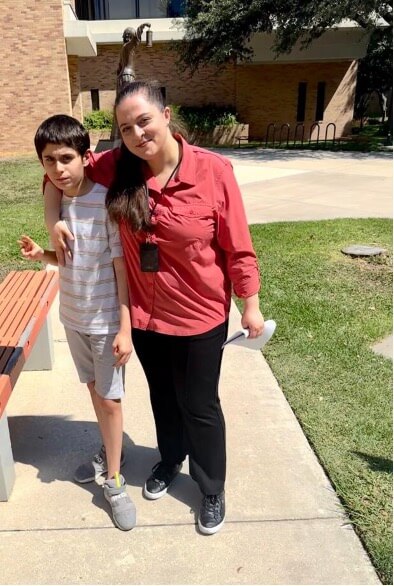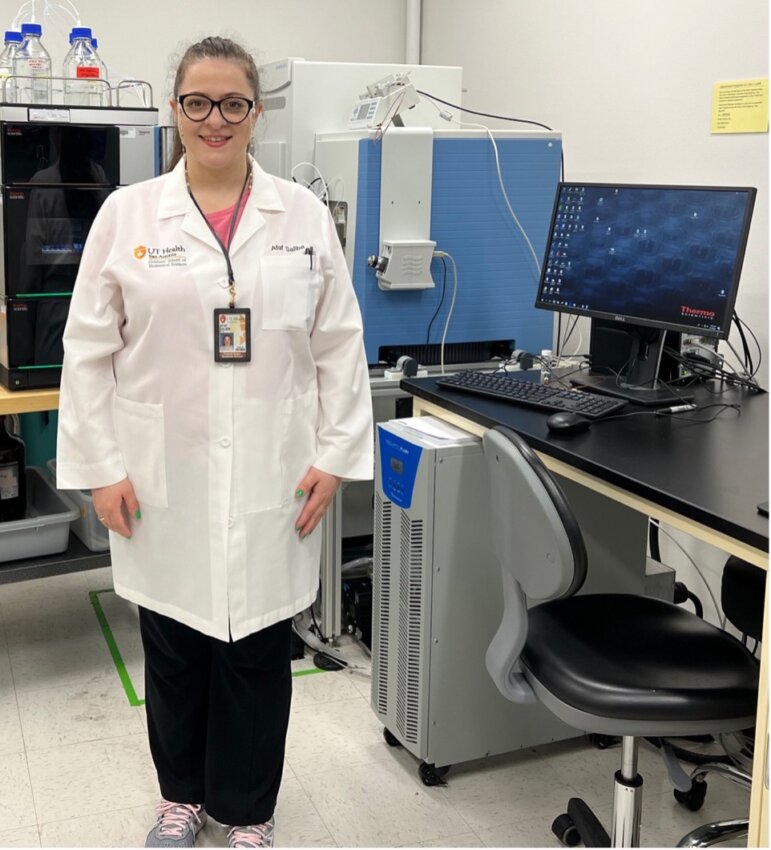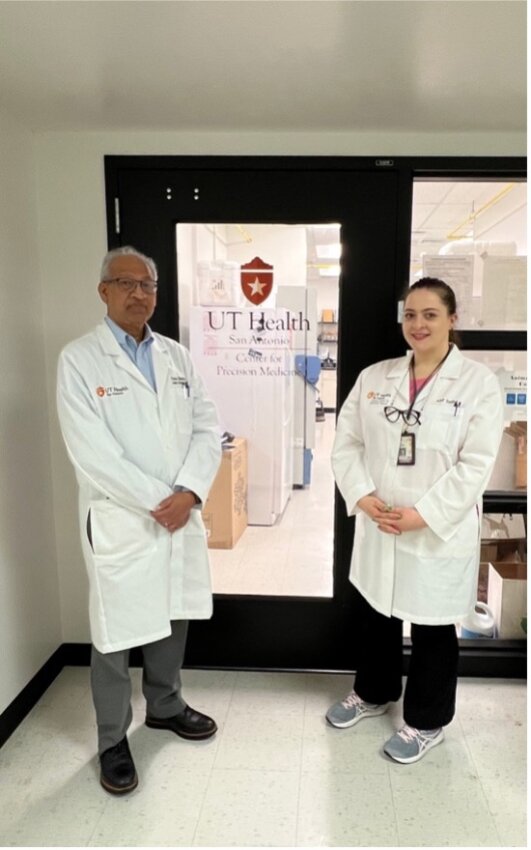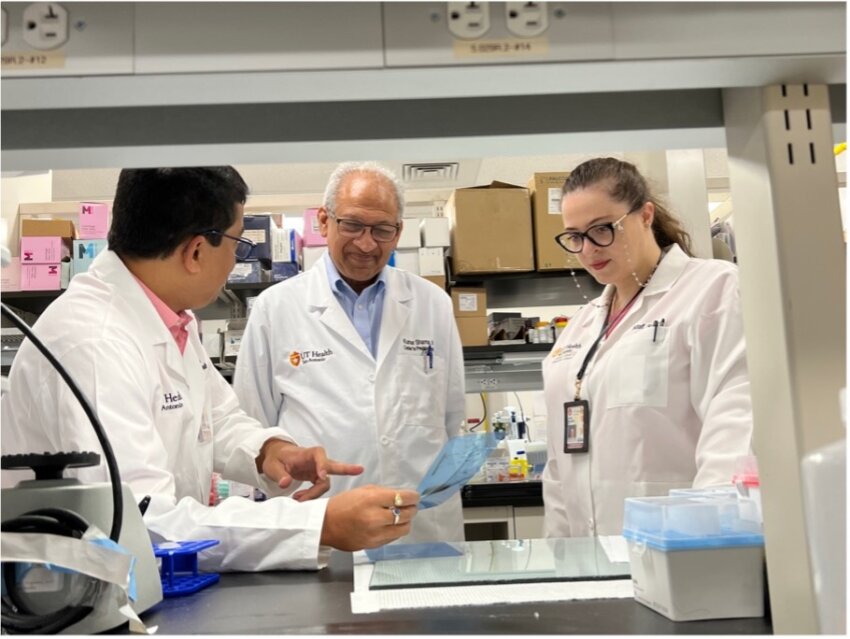Afaf Saliba Jaafar knows firsthand the importance of improving the quality of life for those suffering from challenging medical conditions.
Her 12-year-old son Brandon Jaafar has severe autism.
“The discovery of therapeutics is indeed a lengthy and complex process,” she said. “Families with loved ones suffering from a certain disease often feel a sense of urgency driven by a desire to improve their family member’s quality of life — which affects the whole family’s dynamics.”
As a fifth-year PhD candidate working on her dissertation about the effect of kidney disease on brain health, Jaafar’s personal experience has driven her to seek quality of life improvements for others through her research.
The graduate student began her doctoral research in August 2019 at The University of Texas Health Science Center at San Antonio’s Center for Precision Medicine by exploring previous data and characterizing a mouse model to mimic advanced-stage kidney disease and its impact on the body. Her aim was to identify therapeutic targets for chronic kidney disease.
Keeping an open mind
Jaafar knew she had to keep an open mind by going where the research led her.
“… With science, it’s not always what you expect,” she said. “My project took me in a different direction eventually based … on the results,” Jaafar said. “I had to be very flexible and follow what’s called results-driven research.”
As part of her dissertation research, Jaafar employed metabolomics – a snapshot of all the small molecules in the body. She also used a technology called mass spectrometry imaging at the Center for Precision Medicine. This technology enables researchers to analyze the spatial distribution of hundreds of metabolites in the tissue. By studying these small molecules, scientists can learn a lot about health and even detect signs of disease.

She found that advanced kidney disease in a mouse model resulted in systemic inflammation and an accumulation of neurotoxic metabolites — molecules toxic to neurons — in the kidneys and plasma. These toxic metabolites are part of the kynurenine pathway — the main route for processing tryptophan, an amino acid used to make proteins.
Curious by nature, she wanted to look at the brain to see if these neurotoxic metabolites were there as well. She found increased cell death in the brains of mice with advanced kidney disease traits. While the blood-brain barrier is made up of cells that typically protect the brain from toxins, some toxic tryptophan metabolites could easily diffuse to the brain, she said. This finding led her research in a new direction.
“Every small piece of data led me to the kidney-brain axis project, and I have gratitude to my mentor, who not only facilitated a solid research and intellectual environment, but also instilled in me the courage to explore this path that ignites my passion,” Jaafar said. “The world-class resources and support I receive here are essential for the success of my project and training.”
Advanced kidney disease and the brain
Jaafar hypothesizes that when these neurotoxic metabolites cross the blood-brain barrier, the rate of cell death can outpace the growth of new cells, potentially leading to premature brain aging.
“That’s one possible reason why people who suffer from advanced kidney disease are more prone to develop dementia,” she said.
Jaafar’s mentor of three years, Kumar Sharma, MD, FAHA, FASN, chief of the Division of Nephrology and vice chair for research in the Department of Medicine, said the PhD candidate is breaking new ground with her new hypothesis about the effect of neurotoxic metabolites on the brain.
“I think it’s an amazing achievement for a PhD student to do what she has,” he said. “Part of the reason for her success was the ability to look at the data objectively, not put on blinders and develop new theories to explain the data. She is eager to get guidance from experts, but still follow the data and test her results rigorously.”
Jaafar is planning to submit her dissertation titled, “Accelerated Tryptophan Metabolism: A Link between Advanced Kidney Disease, Systemic Inflammation, and Brain Cell Toxicity,” in May 2024. She is expected to graduate with two first-author and multiple co-author original manuscripts. After that, she may embark on postdoctoral research to test therapeutic approaches to target the accumulation of neurotoxic metabolites in advanced kidney disease. The results could potentially have a translational impact by helping chronic kidney patients in the clinical setting.

“I believe there’s a promising avenue to suppress the production of these detrimental metabolites and testing that in mice would give hope of future clinical studies … to enhance or improve the quality of life of patients living with chronic kidney disease,” Jaafar said. “… But before clinical trials, we have to take many careful steps to make sure everything is safe in clinical research. I am delighted to dedicate my efforts to this exciting and promising journey.”
Grants, awards, recognitions and more
Jaafar’s work has gained wide recognition. She has been awarded support for two consecutive years by the Translational Science Training (TST) TL1 program, which is made possible through a grant from the National Institutes of Health/National Center for Advancing Translational Sciences (NIH/NCATS).
Jaafar underwent intensive training and took courses on translational science — which focus on taking research discoveries from the lab towards clinical practice to benefit individual and public health — and received a translational science national award from the Association for Clinical and Translational Science as the Outstanding Predoctoral Trainee of 2022.
She has earned numerous prizes and travel awards, most recently receiving a travel award from the American Society of Nephrology to attend the annual Kidney Week Conference and the Advances in Research Conference: Multi-Omic Analyses of Tissue Microenvironments in the Kidneys Early Program in Philadelphia. Six abstracts from the Center for Precision Medicine were accepted for the conference, including four invitations for oral presentations.
Jaafar has also been a prominent student leader at the university, advocating for the empowerment of women and community service. Last year, she founded and served as president of the university’s Science Policy Group, now 90 members strong and growing. The group participated in the Viva Science SA event featuring interactive science booths with fun activities for all ages.
“We had a great start with support from the Graduate School of Biomedical Sciences and a competitive Civic Engagement Award from Research!America,” she said. “We focused on educational events for the scientific community at UT Health San Antonio because understanding science policy is important to building a unique scientific identity. We also focused on community engagement last year to spread science, technology, engineering, and math (STEM) spirit and the trust in science.”

Sharma said Jaafar’s dedication, enthusiasm, creativity and background in psychology, neuroscience and genetics, have been key to her success as a graduate student, adding that her personal experiences have also played an important role in her desire to help others through her research.
“[Afaf has] had a lot of life experiences that make her empathic for other individuals,” he said.
Quality of life matters
Social and civil engagement are very important to Jaafar, who believes there should be a social focus on quality of life in addition to the medical component.
“I feel that everything is so hard to get done,” said the mother of three. “Case education, insurance, medical or behavioral treatments … everything that [Brandon] needs, we have to work so hard to learn and get it done. I think a lot of things should be considered in terms of improving quality of life, not only at the biomedical [level], but also … the social support … .”
Jaafar said that devastating medical conditions are already a lot to handle.
For example, consider dialysis patients who must get treatment every day or every other day, whether it’s raining or snowing, whether they’re tired or not. That’s difficult enough, she said.
“Imagine on top of that [if] they have brain fog, they have fatigue, they have depression because of their kidney disease,” Jaafar said. “So, while we embark on the crucial but lengthy process of therapeutic discoveries for kidney disease or for any [disease], let us also work on accessible solutions to improve the quality of life so [patients and their families] will be stronger, more able to face their challenges,” she said.


